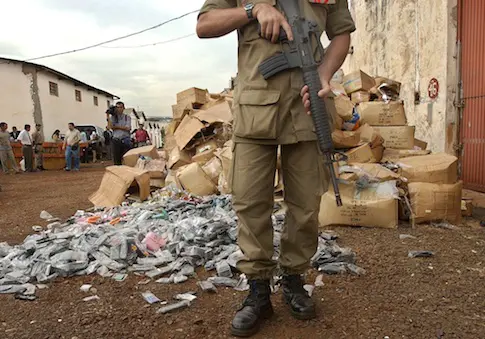The fight against drug trafficking in Latin America requires effective rules to facilitate the exchange of criminal information and joint operations between countries, experts from the criminal justice system told Xinhua.
There are no regional instruments to allow the police in Latin American countries to have an agile coordination when investigating transnational groups, according to Jorge Emilio Iruegas, director at the Office of the Assistant Attorney General for Anti-corruption in the northern Mexican state of Nuevo Leon.
Currently, the time for intelligence information to be exchanged between nations can take months to arrive on investigators' desks because it involves a lot of red tape between foreign ministers and other ministries, said Iruegas, also an expert in the penal system, in an exclusive interview with Xinhua.
"For the Colombian criminal and the Mexican criminal sending just a text message is enough for them to go ahead and carry out the criminal action," said Iruegas, who used to be a civil servant within the Attorney General's Office (PGR), Mexico's federal prosecutors.
The United Nations Development Program (UNDP) has signaled that the generalized problem of drug production and sales in Latin America is directly linked to the violence that the region is currently suffering from, where more than 100,000 murders are committed annually.
In a report issued in 2014, the UNDP called upon Latin American countries to strengthen information and intelligence exchange and promote an effective coordination of police operations in order to dismantle transnational criminal networks.
Only Mexico's Sinaloa Cartel, headed by imprisoned druglord Joaquin "El Chapo" Guzman, has a presence or links with criminals in several Central and South American countries for drug trafficking or money laundering, according to Mexican and United States security agencies.
Iruegas considered the current cooperation between nations stays at the level of heads of procurator's offices or security agencies and is not translated into measures that allow police to be more effective and efficient in their investigations.
"With organized crime being a transnational issue, rules should be established a lot quicker and with less bureaucracy in order to obtain the information from an investigation," he said.
For Alonso Gonzalez-Villalobos, the international law, cooperation and development consultant, the lack of actual coordination mechanisms between police is a pending matter for the governments of the region.
"There is a lot of political discussion about cooperation and collaboration but, very little interoperability. On a day-to-day basis there is no possibility to exchange information," said Gonzalez-Villalobos in an interview.
If coordination improves at regional level, in Mexico, where drug trafficking has brought about a wave of violence for almost a decade, regulations combating organized crime will also need to be perfected, agreed the two experts.
Until now, in Mexico, prosecuting drug traffickers and organized crime gangs has been dealt with by the federal government. However, their operation leads to criminal activities that fall into the jurisdiction of state prosecutors, such as murders and kidnappings, explained Iruegas.
The Nuevo Leon expert added that the current Federal Law Against Organized Crime, which includes exceptional measures such as house arrest, should be modified so that it clearly specifies instruments and powers that the 31 states and Mexico City can use to fight criminals within their jurisdiction.
Gonzalez-Villalobos stressed the need for a national law against organized crime with mechanisms that are compatible with the new adversarial and accusatory justice system.
"The current Federal Law Against Organized Crime is not enough. It has serious problems and doesn't correspond to the political decision that the Mexican government has taken to nationalize criminal procedures," confirmed Gonzalez-Villalobos, who has a Masters in International Law.
Gonzalez-Villalobos warned that the fight against drug trafficking in Mexico and in Latin America in general will not prosper if mechanisms against corruption are not also established as this is a factor that affects the region and allows organized crime to happen.
Latin American countries could have better laws, communication systems and facilities in their security agencies. However, organized crime will continue if corruption among public officials does not reduce, said the consultant.
"The scourge isn't drugs. The scourge is organized crime groups' ability to infiltrate key institutions," Gonzalez-Villalobos noted.
(APD)
 简体中文
简体中文



